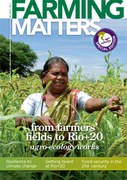Over the years, many readers of our network’s magazines have asked for support material explaining the principles behind sustainable small‑scale farming. The Learning AgriCultures series is ILEIA’s response to these requests. The aim of this educational series is to have more and better trained agricultural educators and students who are able to analyse and promote sustainable family farming systems.
Learning AgriCultures aims to stimulate a culture of learning about sustainable smallscale farming, one that sees the farm as a system rather than made up of separate components. Learning AgriCultures is a learning resource particularly aimed at educators seeking support material for teaching about sustainable agriculture in their courses, at a university or college level, in special NGO training courses or other professional environments.
This material will feed into and provoke discussions and deeper reflections about the important contributions that small-scale farming makes, and what sustainability means in different contexts. Courses in which this series could be useful include agriculture, rural development, environmental studies, research & extension, and agricultural policy-making. They are primarily, but not exclusively, aimed at educators and students working in developing countries.
The Learning AgriCultures series has seven modules, each focusing on a theme connected with sustainable family farm systems, such as soil, water, livestock, marketing and knowledge.
These themes are explored from different angles, from the perspective of
1. the farm,
2. key issues in the wider context, and also
3. governance issues that affect farming sustainability.
All the modules include thought-provoking questions, details of educational support materials: practical cases, exercises, games, photos, videos, checklists for farm visits as well as further references (free books and websites).
The series takes a global perspective with practical cases from all over the world. The different contexts in which small-scale farmers work mean that they face very different problems and opportunities: a family living in the Andean highlands farms in a different way from a family in the Sahel.
Their regional or national governance systems can provide very diverse contexts in which family farmers have to survive. In spite of the tremendous diversity, small-scale farmers share some common characteristics. The Learning AgriCultures series focuses on these commonalities and highlights the differences, from which people all over the world can learn from.
Educators and university lecturers around the world are now using the Learning AgriCultures series: they build on the key concepts and draw inspiration from the practical exercises and case studies, adjusting them to their own context and target groups. They do this independently or in conjunction with ILEIA.
For more information, please us an e-mail: ileia@ileia.org

